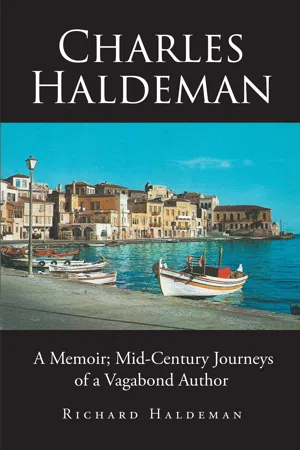
- 210 pages
- English
- ePUB (mobile friendly)
- Available on iOS & Android
About This Book
Charles Haldeman (1931–83) was a man with unusual literary and artistic abilities who sought to identify his and his generation's mission in the world of the midtwentieth century. Charles was born in the Depression; lived six months as a child in Hitler's Germany during the 1930s; grew up in a US Army town during World War II; and traveled, studied, and worked throughout the US, the Pacific, Europe, and Canada during the midtwentieth century. He lived his final 25 years in Greece, where he befriended and hosted the literary elite of this time and published three novels based on his experiences and knowledge of his generation and time. Charles Haldeman's letters reveal his search for his own identity. He was born to a mother from the segregated South and a father who migrated to the United States from Germany less than a decade before Hitler came into power. From an early age he sought to understand and separate himself from the racism in his family's American and German heritage, to reconcile the principles of the American dream with the reality of American life, and to help bring about a world in which human beings no longer used "war as a school for life" to build "monuments to stupidity." Seeking a country where the artist had the freedom to thrive, he made Greece his home, only find ultimate disappointment in his "love affair with Greece." Despite this disappointment and his early death, Charles Haldeman left a legacy of three novels that described a time in American and world history, giving voice to his "silent" generation. This memoir attempts to honor that legacy.
Frequently asked questions
Information
Table of contents
- Prelude
- A South Carolina Interlude and a Visit to Germany
- A New Father, a Tragic Loss, a New Home
- Becoming a Family:New York City Adventures
- The North Country: An Idyllic Summer Before the War
- Sackets Harbor: A Home for the Duration
- A South Carolina Sojourn, Move to Paradise, Paradise Lost
- California, Here I Come:San Diego, 1950–53
- A New York City Interlude; a Special Family
- Back in San Diego, Transfer Denied, 1953
- Preparations for Sea, Long Beach, Fall 1953
- “Twenty-two…a Strange Age…a Strange Year”
- Discovering the War-Ravaged Postwar World, 1954
- September 1954: Settling in New York, Job at Brentano’s
- Frances Steloff and Censorship, Tedium, Home News, Reunions
- Artistic Experiences, a Trip Home, Visiting Henry Miller
- Final Days in New York, Trip Is On, Meeting Eric Gutkind
- Meeting German Family and Viewing “Monuments to…Stupidity”
- Becoming Nonmatriculated Student; Kindness of Sohl Family
- “Everything Is Going Well” with Heidelberg Study
- Spring in Greece and Paris; Fully Matriculated Student
- Trip to Holland, Final Days in Germany
- Athens, 1957–60: Teacher, Mathematician, Artist, Lyricist
- Writing and Publishing The Sun’s Attendant, 1962–63
- A Creative Decade, 1964–74: Author, Film Writer, Magazine Editor
- The Loss of Angel One, an American Sojourn, More Losses
- Years of Personal and Artistic Frustration and a Canadian Film Project
- “A Light Goes Out”: The South Revisited, Final Days in Athens
- A World Long Passed; Vision of a Higher Good